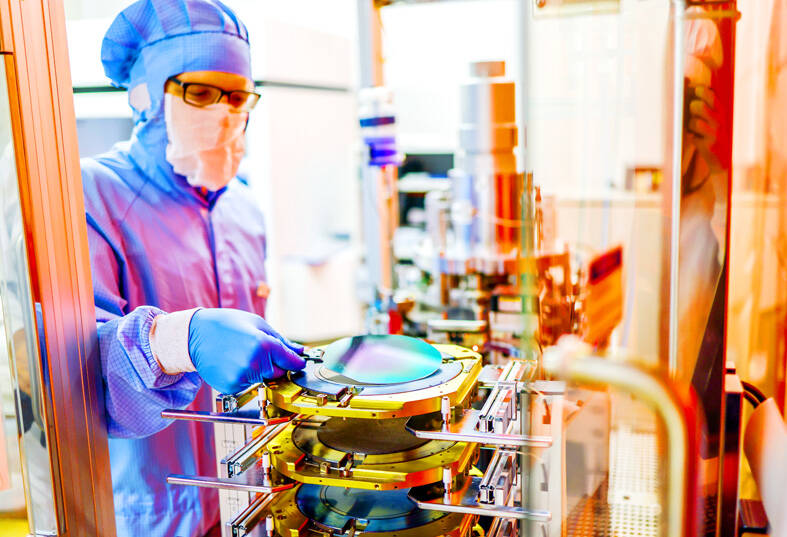In its search for sorely needed talent, German chipmaker Infineon Technologies AG is looking as far as Guatemala, but the rise of the far-right at home risks making the move unappealing and harming the industry.
The semiconductor group has plans for a new 5 billion euro (US$5.4 billion) factory in eastern Germany — and it is not alone.
Backed by huge government subsidies, US chipmaker Intel Corp is planning to build a plant in Magdeburg, while Taiwan Semiconductor Manufacturing Co (台積電) is to put down roots in Dresden.

Photo: EPA-EFE
For all the region’s advantages — a good location and an established industrial base — its politics could yet be a drag.
In Saxony, which already hosts the biggest concentration of chipmakers in Europe, the far-right Alternative for Germany (AfD) party is polling more than 30 percent ahead of European and regional elections later this year.
Success for the AfD risks “holding back our growth potential,” said Frank Boesenberg, head of regional industry lobby group Silicon Saxony.
Chipmakers in Saxony are to have 25,000 jobs to fill by 2030, while the local working-age population is to shrink by 300,000, the group estimates.
“There are too few young people in the region,” Boesenberg said. “We need immigration.”
However, the anti-immigration politics of the AfD could put off potential recruits and damage the industry.
“A policy of isolation is a threat to prosperity,” Infineon CEO Jochen Hanebeck said on professional social network LinkedIn.
As it stands, the large majority of the industrial capacity to produce semiconductors — used in everything from electric vehicles to smartphones — is in Asia.
However, recent supply disruptions and rising geopolitical tensions in the region have prompted a rethink in the US and Europe about depending on imported chips.
The result has been a concerted effort to relocate supply closer to home, leading to a flood of investments into areas like Saxony.
About 68 percent of German managers fear the country could become less attractive to foreign workers if the far-right gains in strength, a poll by the IW Koeln think tank showed.
In January, revelations by investigative outfit Correctiv that AfD members discussed a mass deportation plan at a meeting sparked a wave of protest in Germany.
However, companies such as Jenoptik AG, a producer of optical components for chipmakers, had been warning well before the controversy that the AfD poses a risk to business started.
If the industry is no longer able to find “the right people,” the impact could be felt on the bottom line, Jenoptik chief executive Stefan Traeger told German weekly Der Spiegel in December last year.
A lack of suitable workers was “the biggest challenge” facing Germany’s industry, German Minister for Economic Affairs and Climate Action Robert Habeck said earlier.
The country would need 5 million more workers by 2030 to cover the shortfall in all sectors, IW Koeln said.
At Infineon’s new factory in Dresden, which should begin production in 2026, the group expects to hire 1,000 new workers.
Foreign workers are to be an important “building block” on the way to achieving that target, Infineon human resources head Tom Geyer said.
The group’s workforce in Dresden already has representatives from a few dozen nationalities.
To find potential new hires and bring them to Germany, Infineon has signed deals

Sweeping policy changes under US Secretary of Health and Human Services Robert F. Kennedy Jr are having a chilling effect on vaccine makers as anti-vaccine rhetoric has turned into concrete changes in inoculation schedules and recommendations, investors and executives said. The administration of US President Donald Trump has in the past year upended vaccine recommendations, with the country last month ending its longstanding guidance that all children receive inoculations against flu, hepatitis A and other diseases. The unprecedented changes have led to diminished vaccine usage, hurt the investment case for some biotechs, and created a drag that would likely dent revenues and

Macronix International Co (旺宏), the world’s biggest NOR flash memory supplier, yesterday said it would spend NT$22 billion (US$699.1 million) on capacity expansion this year to increase its production of mid-to-low-density memory chips as the world’s major memorychip suppliers are phasing out the market. The company said its planned capital expenditures are about 11 times higher than the NT$1.8 billion it spent on new facilities and equipment last year. A majority of this year’s outlay would be allocated to step up capacity of multi-level cell (MLC) NAND flash memory chips, which are used in embedded multimedia cards (eMMC), a managed

CULPRITS: Factors that affected the slip included falling global crude oil prices, wait-and-see consumer attitudes due to US tariffs and a different Lunar New Year holiday schedule Taiwan’s retail sales ended a nine-year growth streak last year, slipping 0.2 percent from a year earlier as uncertainty over US tariff policies affected demand for durable goods, data released on Friday by the Ministry of Economic Affairs showed. Last year’s retail sales totaled NT$4.84 trillion (US$153.27 billion), down about NT$9.5 billion, or 0.2 percent, from 2024. Despite the decline, the figure was still the second-highest annual sales total on record. Ministry statistics department deputy head Chen Yu-fang (陳玉芳) said sales of cars, motorcycles and related products, which accounted for 17.4 percent of total retail rales last year, fell NT$68.1 billion, or

In the wake of strong global demand for AI applications, Taiwan’s export-oriented economy accelerated with the composite index of economic indicators flashing the first “red” light in December for one year, indicating the economy is in booming mode, the National Development Council (NDC) said yesterday. Moreover, the index of leading indicators, which gauges the potential state of the economy over the next six months, also moved higher in December amid growing optimism over the outlook, the NDC said. In December, the index of economic indicators rose one point from a month earlier to 38, at the lower end of the “red” light.